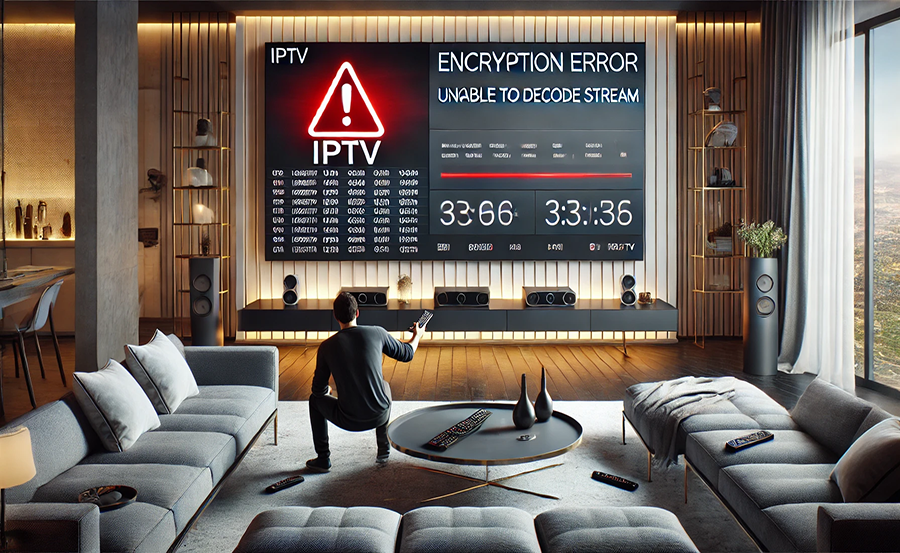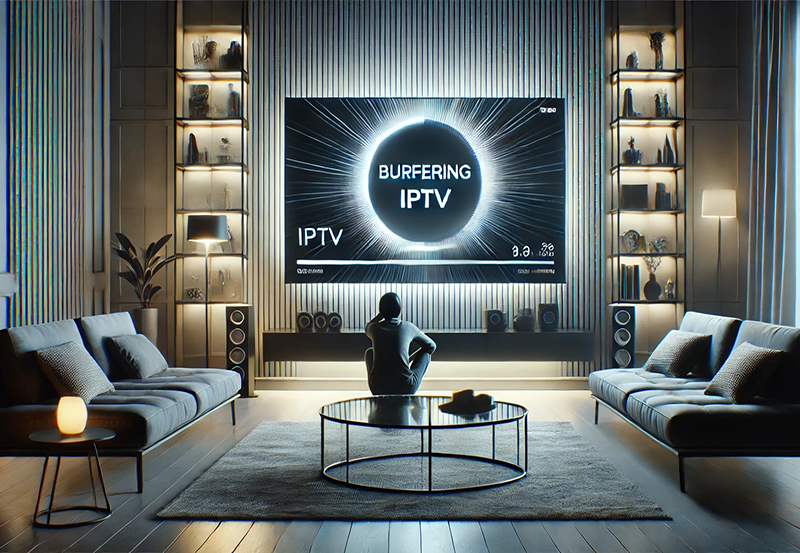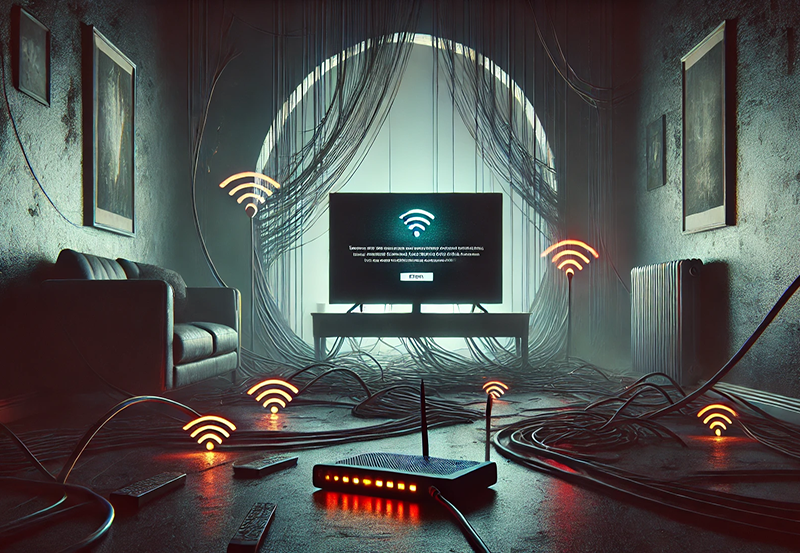In an era where streaming services and internet protocol television (IPTV) are becoming prevalent, encryption errors can be a common yet frustrating obstacle. Many users face challenges like blocked viewing, slow buffers, or puzzling error messages that detract from the experience of affordable IPTV services. This comprehensive guide will walk you through practical solutions, helping you maintain access to the best IPTV channels and ensure superior viewing experiences. With step-by-step solutions, navigating these technical hurdles becomes manageable.
Year IPTV Subscription and Enjoy Unlimited Content
Understanding IPTV Encryption Errors
IPTV encryption errors primarily arise due to the need for secure data transmission between providers and clients. When encryption processes face discrepancies, users may experience interruptions in service. Understanding these errors is the first step towards resolving them effectively.
Common Causes of Encryption Errors
Encryption errors in IPTV systems can occur due to various factors. One common cause is outdated software. As IPTV systems evolve, they require updates to maintain compatibility with encryption standards.
Another frequent issue stems from misconfigurations. Incorrect settings in encryption protocols or firewall restrictions might interrupt the data flow.
Recognizing Error Messages
Decrypting technical jargon in error messages can be a daunting task. Users often encounter messages like “Unable to Decrypt Stream” or “Key Exchange Error.” Recognizing these alerts helps diagnose the underlying issues.
Documentation from both IPTV services and device manufacturers can provide insights into these error messages, offering guidance on troubleshooting strategies.
Step-by-Step Solutions to Resolve IPTV Encryption Errors
Basic Troubleshooting Techniques
Before delving into technical fixes, some basic troubleshooting steps can resolve minor encryption errors. Rebooting your device and router often clears temporary conflicts in your network setting.
Verify your internet connection speed. Slow internet can mimic encryption errors by causing buffering and lagging. A quick speed test can determine if your bandwidth meets the required threshold.
Updating Software and Firmware
Keeping your IPTV software and hardware firmware up to date is crucial. Providers frequently release updates to patch vulnerabilities and enhance encryption stability.
Access the settings menu on your IPTV device and check for software updates. If available, downloading and installing these updates can rectify compatibility issues.
Confirguring Router Settings
Your router’s settings can significantly impact IPTV performance. Ensure the firmware of your router is updated. Many IPTV encryption issues are resolved by allowing IPTV traffic through firewall and QoS settings.
Navigating your router’s admin panel, enabling protocols like UPnP, or configuring the correct port forwarding rules can enhance data transmission across the network.
Advanced Security Measures
Implementing VPN for Secure Streaming
A Virtual Private Network (VPN) offers a private tunnel for data, masking IP addresses and providing security. Installing a reputable VPN service can help bypass regional restrictions and maintain a consistent connection.
Ensure the VPN service selected supports streaming and offers good encryption standards. It should not significantly affect streaming quality or speed.
Firewall and Antivirus Configurations
Firewalls and antivirus software, while important for security, can sometimes hinder IPTV performance. Configuring exceptions in these systems can reduce encryption errors.
Adding your IPTV service as a permitted application or simply adjusting the default security level can make a substantial difference.
Ensuring a Quality Viewing Experience
Optimizing Your Internet Connection
For a seamless IPTV experience, optimizing your home internet is essential. Prioritize a wired Ethernet connection over Wi-Fi to reduce latency. If that’s not possible, positioning your router closer to your device can help.
Network congestion can also affect performance. Limiting the number of devices using the internet simultaneously may improve streaming quality significantly.
Selecting the Best IPTV Channels
To enjoy superior IPTV viewing, choosing high-quality channels that offer reliable streams is key. Multiple services offer varying packages; evaluating content quality and stability can help in selecting the best option.
User reviews and trial periods are excellent ways to gauge the performance of affordable IPTV services before committing to long-term plans.
Exploring Additional Troubleshooting Methods
Consulting with IPTV Providers
If self-troubleshooting methods fail, reaching out to your IPTV provider can yield substantive results. Providers have technical teams that deal specifically with encryption errors.
Documenting the error messages or symptoms before contacting support provides the technical staff with the necessary information to expedite solutions.
Utilizing Online Forums and Communities
Online forums and tech communities are valuable resources. Platforms like Reddit and specialized IPTV forums host discussions and solutions contributed by seasoned users.
These include potential troubleshooting methods, reviews of services, and personal anecdotes that offer communal knowledge to address common issues.
Continuous Improvement and Prevention Strategies
Regular Maintenance and Updates
Preventive measures can often save significant hassle. Establishing a routine for checking both IPTV software updates and router configurations ensures sustained performance.
Consider setting aside time monthly or quarterly to review these elements, preventing most encryption errors from emerging.
Monitoring Service Updates and News
Staying informed about your IPTV service’s updates and global trends in encryption technology can provide early warnings about potential service disruptions.
Subscribing to newsletters or forums affiliated with your IPTV provider keeps you in the loop on the latest improvements or challenges they’re encountering.
Wrapping Up Your IPT Experience
Facing encryption errors with your IPTV service is admittedly not the most straightforward of tasks. However, by following structured steps and remaining informed, users can demystify these technical barriers, maintaining access to quality entertainment seamlessly. With a commitment to regular updates and security practices, your IPTV experience can be both reliable and enriching.
FAQs

How often should I update my IPTV software?
It’s advisable to check for software updates monthly. Updates often include essential security patches and compatibility improvements.
Can a VPN improve my IPTV performance?
Yes, using a VPN can enhance security and bypass regional restrictions, but ensure it does not degrade your streaming speed significantly.
What are the signs of an IPTV encryption error?
Common signs include buffering, error messages during decrypting streams, or unexpected service interruptions.
Is a wired connection better for IPTV?
Yes, a wired Ethernet connection is generally more stable and faster than Wi-Fi, reducing the potential for streaming issues.
How can I choose the best IPTV channels?
Evaluate providers based on user reviews, trial offers, and the quality of their streaming services before subscribing to long-term plans.
What should I do if basic troubleshooting fails?
Contacting your IPTV provider’s technical support with detailed error descriptions is recommended if initial solutions prove ineffective.
Are online communities helpful for resolving encryption errors?
Absolutely, they often provide shared experiences and tips that might not be highlighted in official troubleshooting guides.
Fixing Audio Problems with M3U Links on VLC Media Player





